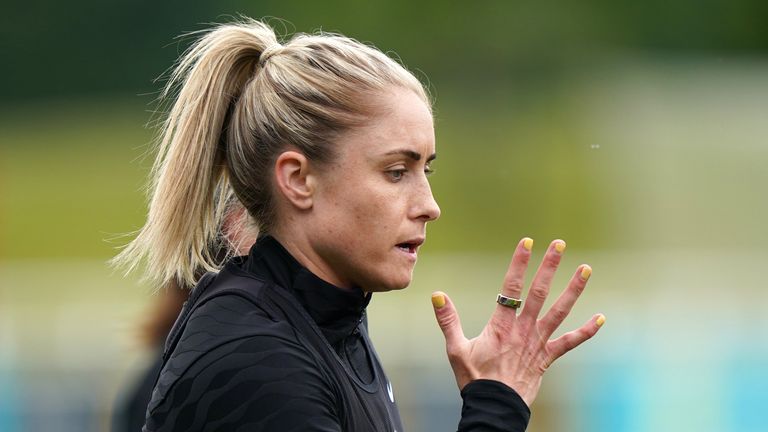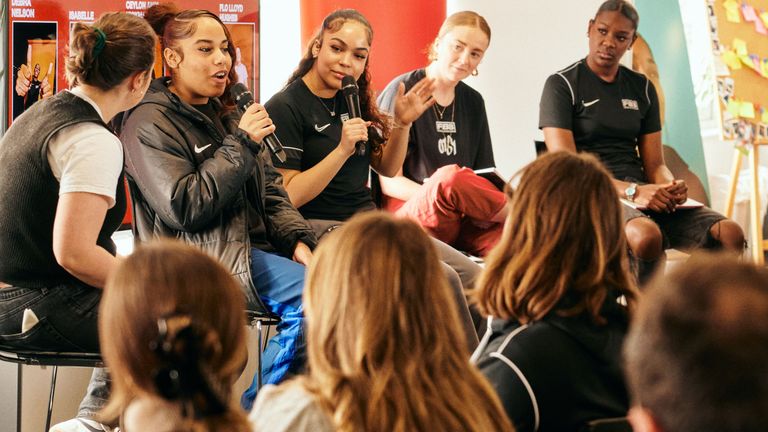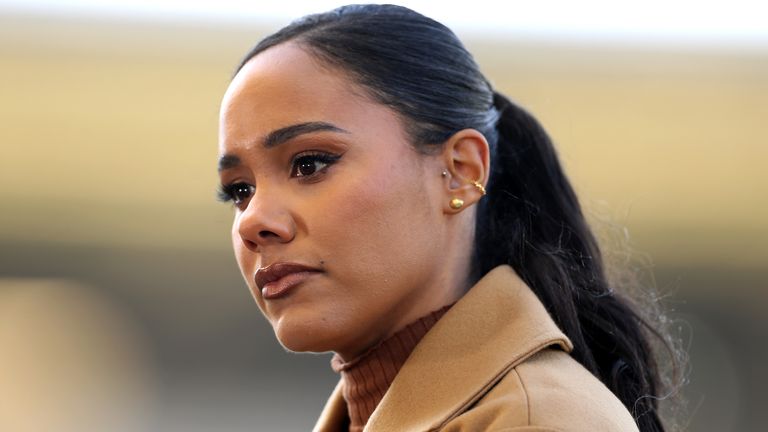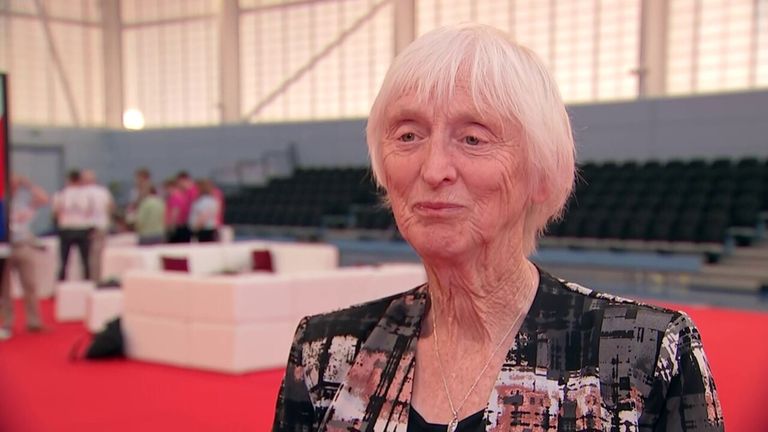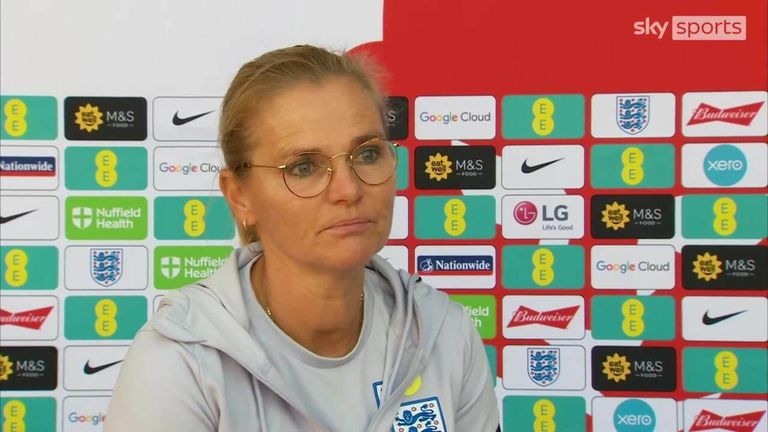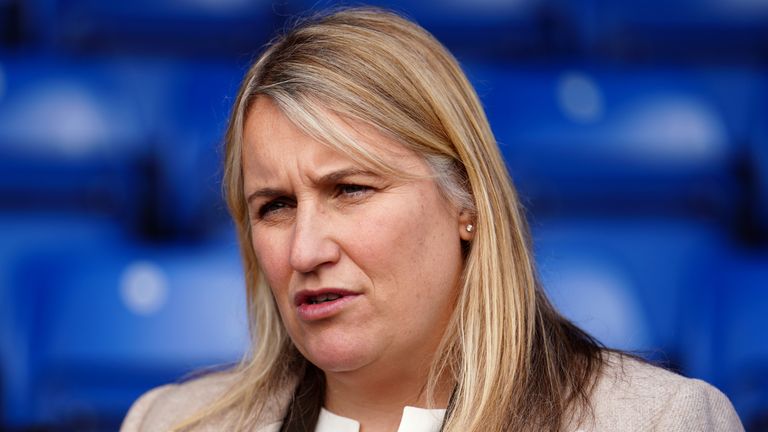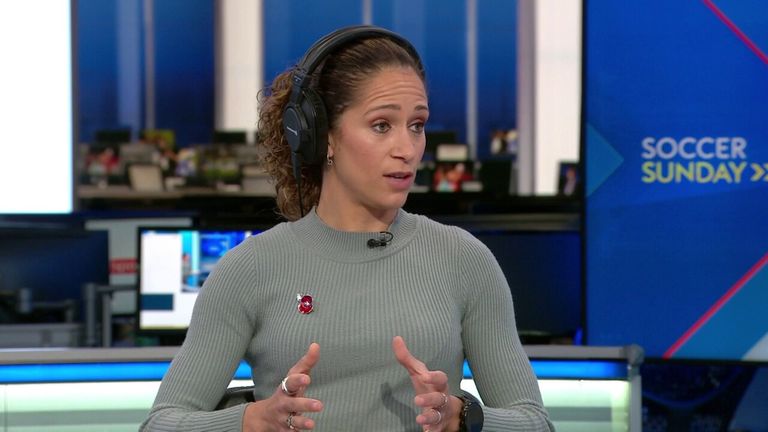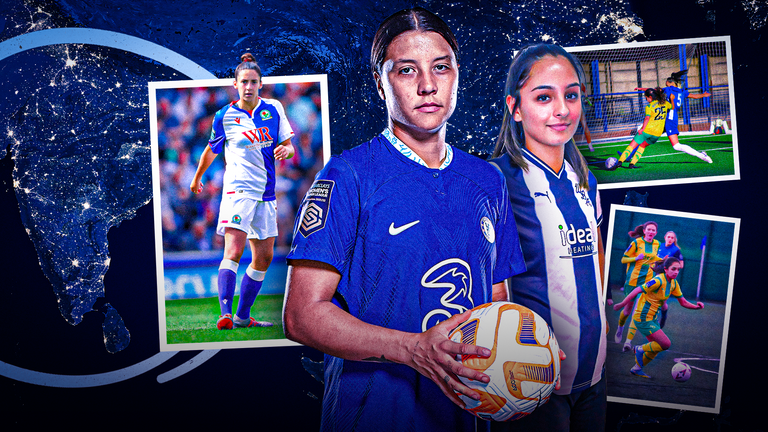England Women's Euros win has had little effect on inner-city teenage girls' engagement with women's football, report finds
Report calls for action to support Lionesses' legacy; Alex Scott: "Now in women's football people think it's great. It's fully professional. They think about the Lionesses. This research shows that there's still so much work to do. There's a disconnect and improvements we need to make."
Tuesday 11 April 2023 10:50, UK
Almost half of inner-city teenage girls (46 per cent) are watching more football since last year's Women's Euros, but the majority still cannot name a current England Lioness, according to a new report.
Just over a quarter (26 per cent) said they watch women's football at least once a week. But despite England's historic win last summer, almost two in three teenage girls (63 per cent) are unable to name any of the current football team, according to the Football Beyond Borders and Youth Beyond Borders report.
- Stream all WSL games live with a NOW pass
- Women's Super League table | Women's Super League fixtures
- Get Sky Sports | Download the Sky Sports App
With 100 days to go before the Women's World Cup starts in Australia and New Zealand, one in four girls still never watch women's football, despite 56 per cent of those polled confirming they had watched at least one match during the UEFA Women's Euros in England.
Less than a fifth (17 per cent) are part of a club, according to the survey of 650 teenage girls, of which 70 per cent are based in inner cities.
The report found that 67 per cent of teenage girls do not follow any women's football players on social media, while 69 per cent have not purchased anything football related since the Euros. It also revealed that half of teenage girls who don't currently play football video games are interested in playing them.
The research, launched at an event with England centurions Karen Carney and Rachel Yankey, and acclaimed broadcaster Flo Lloyd-Hughes in attendance, concludes last summer's Euros win "has had little effect on inner-city teenage girls' engagement with women's football".
England legend Alex Scott: There is a disconnect
Former Arsenal and England right-back Alex Scott, who was also present at the launch, said: "Now in women's football people think it's great. It's fully professional. They think about the Lionesses. This research shows that there's still so much work to do. There's a disconnect and improvements we need to make."
According to the report, the nation could fall short on delivering on the legacy of the Lionesses and the objectives outlined by Baroness Sue Campbell and The Football Association in advance of last year's UEFA Women's Euros.
The Football Association told Sky Sports News it has partnered with Football Beyond Borders to fund and run leadership camps for young female teenagers at St George's Park since 2019.
The FA pointed to a record-breaking year for the women's game, which saw the Lionesses go unbeaten, adding participation has increased.
An FA spokesperson added: "Football Beyond Borders is doing vital work to support the growth of women's football. We also recognise the need to engage differently with young people, and share the commitment to ensuring it is a game for all. That includes working with government so every girl can have the chance to play in school.
"We have also completely restructured our talent pathway so more young girls from all backgrounds can find a local place to play and are then ensuring it is possible for the very best talent to be identified. Of course, while progress is being made, there is always more to do."
Girls will be granted equal access to all school sport as part of a package of measures unveiled by the government last month to coincide with International Women's Day.
Schools in England will be told they must deliver a minimum of two hours of PE each week and that girls and boys should be able to play the same sports in lessons and extra-curricular clubs.
- International Women's Day 2023: All the best stories from across Sky Sports
- Tracey Leaburn: The woman at the beating heart of Charlton
- Get Sky Sports | Download the Sky Sports App
The move came in response to a campaign launched by the Lionesses squad in the wake of their Euros triumph, in which they urged the government to pass measures to ensure that all girls get the chance to play football at school.
It was an initiative spearheaded by Arsenal and England defender Lotte Wubben-Moy, who told Sky Sports in September why it was a cause so close to her heart.
A few weeks before the announcement, Chelsea manager Emma Hayes branded women's football as "middle class" in relation to the talent coming through.
Hayes said: "In terms of the locations, the pedigree of the player, they're often coming from suburban belts around the training grounds. They're not the Alex Scotts, the Rachel Yankeys, the Anita Asantes. They're not coming to our facilities in the same way and you've got to ask yourself the question: Why?"
Lack of diversity 'plays on my mind'
The Lionesses triumphant Euros campaign captured the hearts and minds of the nation, but their triumph rekindled the debate about diversity at the elite end of the game after England fielded an all-white starting XI for every match of the tournament.
The report points to the lack of diversity in the Lionesses' squad, adding that it "reflects a lack of diversity within the wider women's football community and infrastructure".
Maria, who is 17 and took part in the research, said: "The lack of diversity in the Lionesses is something that plays on my mind. Only having three Lionesses of colour in the team was disheartening to see as there wasn't much representation of me and my black friends who love football.
"I hope to see more diversity in games and I hope the next generation feel more inclined to kick a ball."
South Asian heritage female player timeline launches
South Asian women, who are the single-largest ethnic minority female group in the country, have historically been overlooked in these conversations.
In an effort to help tackle this and inspire the next generation, Sky Sports has created a first-of-its-kind timeline documenting the modern-day history of South Asian heritage female players in the English game as part of a wider display with national charity Sporting Equals.
Marking the evolution of women's football in the Women's Super League era, the timeline highlights 20 current and former players from South Asian backgrounds, who have blazed a trail in the game in different leagues across Britain.
The timeline was launched at Stamford Bridge at the end of last month, with four role model players from the community - Millie Chandarana (Blackburn Rovers), Simran Jhamat (Coventry United), Kira Rai (Derby County) and Mariam Mahmood (West Bromwich Albion) - also showcased.
Rovers midfielder Chandarana said: "This is a very important project, which documents progress and helps change the narrative. We can now see all the great things that these girls have achieved and continue to achieve, and it's great to be a small part of it.
"I hope it gives inspiration to many more, to show that a career in football is possible for women from the South Asian community."
MSA chair and FA National Game Board member Yashmin Harun added: "It's very important to understand the history of South Asian female players in the game and reflect on their journeys for us to get to where we want to get to in terms of making elite women's football more diverse and representative of the nation.
"These inspiring women are brilliant role models, who are changing the way we look at the game and are paving the way for the next generation to thrive. They are turning dreamers into believers and it's important to shine a light on them and celebrate the achievements."

